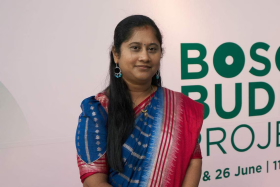Unforgettable journey for caregivers of dementia patients
Support channels helping to make Singapore more dementia-friendly
When the sun sets, Mr Pang Ah Leng, 88, gets confused.
He paces around his five-room flat in Choa Chu Kang, occasionally blurting out incomprehensible statements.
Sometimes, he removes his pants in the living room.
Mr Pang suffers from sundowning syndrome, a common symptom among Alzheimer's patients where sufferers get more disoriented and confused later in the day, said Dr Ng Chong Jin, a consultant at the department of geriatric medicine at Khoo Teck Puat Hospital (KTPH).
September is World Alzheimer's Month and last Thursday was World Alzheimer's Day. Alzheimer's disease is the most common type of dementia.
There are about 45,000 people with dementia in Singapore. By 2050, this is expected to increase fivefold to 241,000.
As our population ages, Singapore is working to become a more dementia-friendly country with 58 go-to points islandwide where dementia patients can receive assistance when they get lost. The Sree Narayana Mission Nursing Home in Yishun is the first 24-hour go-to point.
FORGET US NOT INITIATIVE
Under the Forget Us Not Initiative by KTPH and Lien Foundation, 2,000 Yishun residents are trained to support dementia patients.
Queenstown, Bedok, MacPherson and Hong Kah North are also dementia-friendly communities.
Senior Minister of State for Health Amy Khor said: "We need to work with the community and society at large to build ecosystems of care around our caregivers and their loved ones."
Such help is a godsend for caregivers like Mr Pang's son, Mr Pang Teck Chye, 60. The elder Mr Pang was diagnosed with Alzheimer's last year.
Since March last year, Mr Pang Ah Leng has gone missing more than 10 times. He was found by police and passers-by in places like Tuas, Thomson Road, Red Hill, Bukit Panjang and Clementi.
Mr Pang Teck Chye said: "We get so anxious because we have no idea where he is. Once, he fell while wandering in Tanjong Pagar and had to be taken to hospital because he was badly bruised."
The elder Mr Pang was referred by the Agency for Integrated Care to Hong Kah North Day Care Centre, which provides careservices for 40 elderly patients.
His son said the elder Mr Pang is happier now: "He was reluctant to go at first. Now he looks forward to seeing his new friends. His temper has improved too."
Dr Ng said it can be overwhelming for caregivers after the initial diagnosis, especially when they are not familiar with dementia.
When Ms Foo Mui Leng, 57, realised her father, Mr Foo Kok Chien, 84, had Alzheimer's, she shook in fear. She recalled: "I was asking myself, 'what am I going to do?'"
-
Symptoms of dementia
- Poor or decreased judgment
- Changes in mood or behaviour
- Changes in personality
- Confusion of time and place
- Difficulty solving problems or planning
- Memory loss that affects day-to-day functions
- Misplacing things
- Problems communicating
- Difficulty doing familiar tasks
- Withdrawal from work or social activities
Source: Health Promotion Board
Her father immersed himself in watching TV and forgot to bathe. He insisted on eating identical meals and refused medication by throwing tantrums.
"He behaves like a child sometimes," said Ms Foo. They also had problems communicating as he was partially deaf.
Hearing loss is a dementia risk factor identified in a study published in The Lancet, a leading medical journal. Other notable factors include diabetes, physical inactivity, smoking and late-life depression.
Ms Foo struggled to deal with her father's symptoms and experienced frequent burn-outs. "I was lost. It was a foreign situation for me," she said.
Overwhelmed with stress, she approached Hua Mei Dementia Care System (DCS) for help. The organisation's home intervention team provided Ms Foo caregiver support and guidance.
Ms Foo said: "It is tough and I'm still learning, but luckily I have their help. They are like angels in my life."
Dr Ng emphasised caregivers should tap on channels of support in the community.
Ms Ng Swee Larn, 57, attended support groups and counselling sessions by the Alzheimer's Disease Association (ADA) while caring for her mother, Madam Soo Hoo Bong Har, 85, who had mixed dementia and died in March this year of pancreatic cancer.
The support channels provided Ms Ng with a safe avenue to open up about her feelings. She struggled with frustration and grief when her outgoing mother became socially withdrawn.
Madam Soo Hoo would lock herself in the bedroom to avoid interacting with people and became depressed.
"Mum was not the mum I knew anymore," said Ms Ng.
Ms Ng Jek Mui, a senior social worker from ADA said: "Caregivers experience a sense of loss because they miss how their loved ones were like before."
On her caregiving journey, Ms Ng Swee Larn said: "There were ups and downs, but also many unexpected treasures. I focused on creating happy memories and appreciating little moments."
She recalled how her mother held her hands and stroked them lovingly.
Ms Ng Jek Mui said dementia patients express their appreciation with gestures as cognitive impairment makes verbal expression harder for them.
Caregiving can also be a rewarding journey, she added.
It gave Mr Pang Teck Chye, whose parents broke up when he was young, a chance to rebuild his relationship with his estranged father.When his older brother struggled to cope as the sole caregiver, Mr Pang Teck Chye stepped in to help.
He said: "Caregiving should be a shared responsibility. It is impossible to do it alone."
Mr Pang hopes to show his children the importance of filial piety by setting an example.
"No matter what, he is still my father and I will never give up on him," he said.
Get The New Paper on your phone with the free TNP app. Download from the Apple App Store or Google Play Store now




